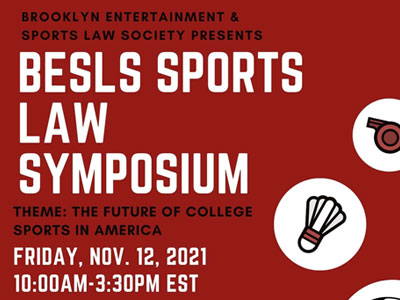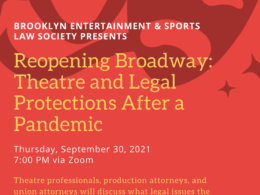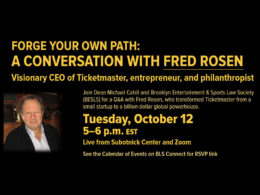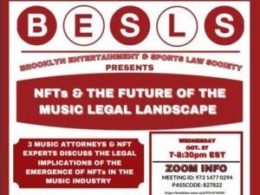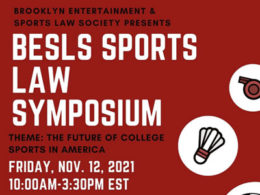On November 12th the Brooklyn Entertainment and Sports Law Society (BESLS) hosted its inaugural (virtual) Sports Law Symposium. The Symposium theme was “The Future of College Sports in America” and the final panel of the day discussed the NCAA’s interim name, image, and likeness (NIL) rule and the evolving regulatory framework.
Darren Heitner moderated the NIL panel, and was joined by panelists Jim Ivler, Tamara Britt, Gregg Clifton, and Maddie Salamone. Mr. Heitner’s expertise in the field combined with Mr. Ivler’s unique experiences as an NFL agent, Ms. Britt’s role at the university level, Mr. Clifton’s broad legal knowledge, and Ms. Salamone’s experiences as both a former college athlete and lawyer, lent to an extremely valuable discussion with input from various different viewpoints.
Mr. Heitner has been referred to as one of the foremost experts on name, image, and likeness by USA Today, a power player in NIL deals by Action Network, and a top sports trademark attorney by Sportico. As an athlete advocate, lawyer, and expert in the sports agent field, Heitner was able to relate to all panelists as well as lead the meaningful discussion. Specifically, Heitner emphasized how all parties to the new NIL landscape have different goals, preferences, and restrictions. Athletes want to exploit their new rights, lawyers hope for more solidified, universal regulations, agents must weigh present and future business opportunities, and schools want to provide their students with the greatest educational and athletic benefits. Clearly, there is a difficult balance in regards to navigating the new rules, and Heitner did a fantastic job of gathering the perspectives of all panelists.
Mr. Ivler, an NFL agent at Sportstars, Inc., explained how NIL has been the biggest change to his business throughout his entire career. Now that college athletes can profit off of their name, image, and likeness, Ivler must evaluate the proper amount of attention to give these student athletes. Specifically, the ultimate goal in the agent business is signing athletes once they decide to go pro; therefore, assisting student-athletes with their NIL initiatives can either be a great business decision or a waste of time and resources. Overall, the agent business is still trying to develop strategies on how much time and effort to devote to college-athlete NIL.
Next, Ms. Britt, general counsel at Manhattan College, spoke about the importance of giving educational institutions a voice in the development of new rules and regulations. Educational institutions are there to provide benefits for the student-athletes, and that goal is hampered if the NCAA, brands, and agents negotiate rules without being mindful of the role of college athletes as students as well. While Britt emphasized that she is in favor of student-athletes having the opportunity to profit off of their name, image, and likeness, she also expressed concerns over NIL having an adverse effect on athlete’s educational opportunities.
Mr. Clifton, principal in the Jackson Lewis P.C. Phoenix office and co-leader of the Sports industry group, talked about the need for a uniform NIL framework. Clifton discussed how athletes, agents, brands, and instutuions must exercise extreme caution when navigating the new world of NIL. Given that rules vary by state, athletes risk losing their eligibility if they are not well-informed. Specifically, Clifton is calling on Congress to adopt a uniform, universal NIL framework so that athletes can truly exploit this new opportunity without risking their college sports careers.
Lastly, Ms. Salamone, a former D1 college lacrosse player at Duke and current sports law podcast host, gave insight into her life as both an athlete and lawyer. Salamone spoke about how the new NIL rule affects everyone differently––men’s football and basketball vs. other sports, agent business opportunities, brand development and marketing, and the role of colleges and universities. While Salamone expressed how great and overdue this new NIL rule is, there is also an immense amount of questions surrounding it. For college athletes to truly experience the benefits that the NIL rules are meant to produce, Salamone insists that there needs to be much more clarity and advocacy.
Overall, the panel provided great insight into this new world of college athlete NIL. Various perspectives combined with strong expertise helped lend the audience a sophisticated overview of what is currently happening and what we can expect to see in the coming days, months, and years.
We thank all of our panelists for partaking in this symposium, and look forward to following future NCAA developments regarding Name, Image, Likeness.
Written by: Dan Erber
Dan is a 2023 J.D. Candidate at Brooklyn Law School
